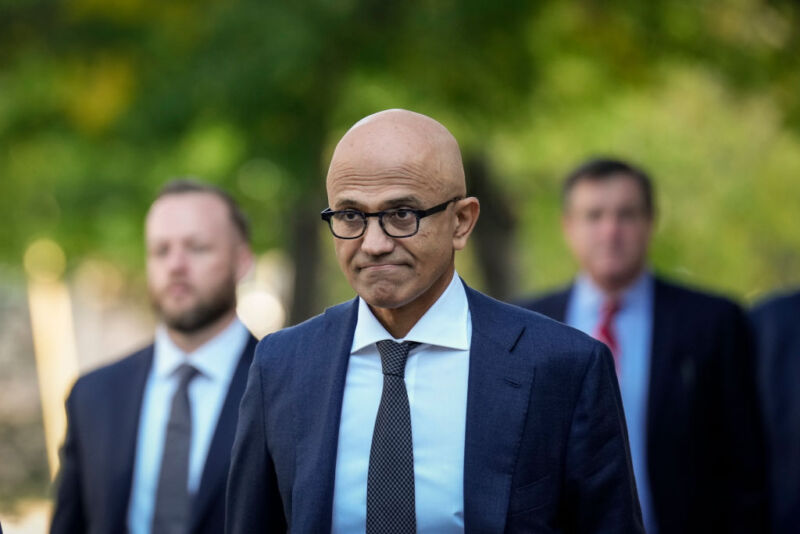
On Monday, Microsoft CEO Satya Nadella showed up at the Google antitrust trial to back the Department of Justice's argument that "Google used unfair tactics"—most significantly, default search contracts—to block opportunities for search competitors like Bing, The Wall Street Journal reported.
A Microsoft spokesperson provided Ars with a transcript of Nadella's morning testimony. It excludes approximately an hour's worth of testimony from the afternoon session (that transcript is not yet available). But it includes about an hour of questioning from DOJ lawyer Adam Severt, during which Nadella said that due to Google's grip on mobile providers and browsers' default search placements, the idea that users have real choices when selecting a search engine is "bogus."
However, Nadella's efforts to back the DOJ seemingly required that the CEO walk back some of his earliest remarks hyping AI-powered Bing as potentially giving Microsoft a long-sought-after competitive advantage over Google.
At the trial, Nadella said that in Silicon Valley, Internet search is “the biggest no-fly zone,” which the Journal characterized as "the hardest market to crack." Nadella said that even Microsoft's seeming lead in artificial intelligence—it invested billions into OpenAI—likely won't be enough to change that due to the "limits to how much artificial intelligence can reshape the market as it exists today," the WSJ reported.
While Nadella—during Bing's rollout earlier this year—had once suggested that the technology represented a “new day” in search, at trial, Nadella attributed his "exuberance" during that rollout to being "someone who has like 3 percent share" of search who started thinking "that maybe I’ll have 3.5 percent share.”
According to the WSJ, as of August, even that modest goal hasn't happened. Third-party data showed that "Microsoft’s share of the search market has hardly budged" since adding AI features to Bing, but Google’s lead trial counsel, John Schmidtlein, argued that this was "a direct result of Microsoft’s missteps in Internet search," not due to Google's command of the market.
Nadella disputed this, telling the court that even ChatGPT isn't well-positioned to overtake Google in search markets because, for most users, Google is the most readily accessible and obvious choice.
“You get up in the morning, you brush your teeth, and you search on Google," Nadella said. "With that level of habit forming, the only way to change is by changing defaults.”
Nadella also expressed significant concern that emerging AI technology—rather than providing opportunities for competitors like Bing—could ultimately further entrench Google's dominance in search without the court's interference.
"The distribution advantage Google has today doesn’t go away,” Nadella said on the stand. “In fact, if anything, I worry a lot that—even in spite of my enthusiasm that there is a new angle with AI—this vicious cycle that I’m trapped in could even become even more vicious because the defaults get reinforced.” He added: "This going to be even worse of a nightmare to make progress in search, because there's a new avenue" for Google to "lock up essentially" the "thing that feeds" AI models, "which is content."
For the DOJ, Nadella's testimony was meant to show that Google's dominance in the market is so insurmountable that a company as big as Microsoft, even by investing potentially more than Google, can't compete.
But that doesn't stop Microsoft from trying. Nadella told the court that to Microsoft, search is "a hard game to make any breakthroughs, but no one can accuse us of not being persistent."
“I see search or Internet search as the largest software category out there," Nadella testified. "We are a very, very low-share player. But we continue to persist in it because we think of it as a software category we can contribute to.”
Google did not immediately respond to Ars' request for comment.
reader comments
116